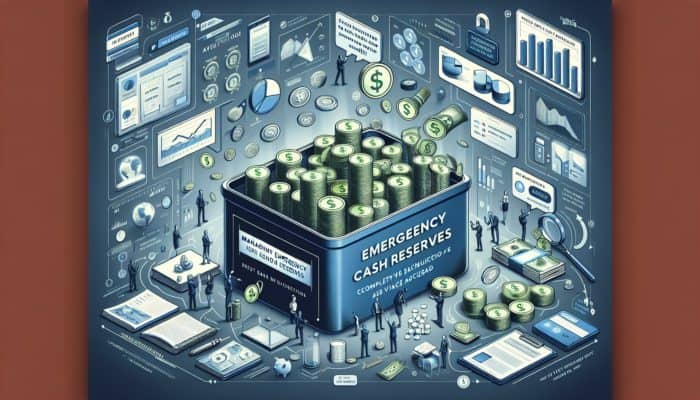Understanding the Significance of Emergency Cash Reserves for Financial Stability
Why Are Emergency Cash Reserves Crucial for Financial Health?

Emergency Cash Reserves: Emergency cash reserves are crucial for anyone seeking to protect their financial stability against unexpected expenses. These funds serve as a crucial safety net, offering the peace of mind necessary during unforeseen crises. The ability to access cash without disrupting long-term savings or investments empowers individuals and families to navigate challenges with greater ease and confidence. The key advantages of maintaining emergency cash reserves include:
- Financial Security: Having readily available cash can significantly reduce reliance on credit, thus protecting your overall financial health.
- Peace of Mind: The assurance that funds are accessible for emergencies alleviates stress and anxiety.
- Flexibility: Emergency funds enable rapid responses to urgent situations, such as medical emergencies or unexpected car repairs.
- Improved Decision-Making: With an emergency fund established, individuals can make informed decisions without the pressure of financial instability.
- Protection Against Debt: Emergency cash reserves help avoid the pitfalls of high-interest debt during crises.
- Support for Financial Goals: Having a financial cushion ensures uninterrupted progress towards long-term financial goals.
Establishing an emergency cash reserve fortifies your financial foundation, ensuring you are prepared for life’s unpredictable events and challenges.
How Much Should You Save in Emergency Funds to Ensure Financial Stability?
Determining the appropriate amount to save in emergency funds depends on various personal factors, including your income, expenses, and the potential risks associated with different life situations. A widely accepted guideline suggests that individuals should aim to save enough to cover three to six months of living expenses. This amount can provide a vital buffer in the event of job loss, medical emergencies, or unexpected major repairs. However, the ideal savings figure may differ based on individual circumstances:
- Job Stability: Those with unstable employment should aim for the higher end of the spectrum.
- Dependents: Families with children or elderly relatives may require more substantial reserves to meet their needs.
- Cost of Living: Individuals residing in areas with a high cost of living may need larger emergency funds.
- Health Considerations: Individuals with chronic medical conditions should factor in potential medical expenses when making their calculations.
Beyond the general guidelines, it is crucial to regularly reassess your financial situation and adjust your savings goals accordingly. This proactive approach ensures you remain adequately prepared for unforeseen circumstances, fostering a sense of financial security.
Effective Strategies for Building a Robust Emergency Fund
Building an emergency fund does not have to feel overwhelming. With strategic planning and consistent efforts, you can create a strong financial safety net. One of the most effective strategies is consistent saving. Setting a clear monthly savings goal and automating deposits into your emergency savings account can streamline the process. Additionally, consider cutting unnecessary expenses, such as subscription services or frequent dining out, to free up additional funds for savings. Exploring alternative income sources, such as part-time work, freelancing, or selling unused items, can significantly bolster your emergency fund. Here are some actionable strategies to consider:
- Set Small, Achievable Goals: Focus on incremental savings targets to avoid feeling overwhelmed.
- Use Windfalls Wisely: Allocate bonuses, tax refunds, or gifts directly to your emergency fund to quickly boost your savings.
- Regularly Review Your Budget: Identify areas where you can save more effectively.
- Join a Savings Challenge: Participate in community savings initiatives to stay motivated and accountable.
By employing these strategies, you can steadily build a solid emergency fund that enhances your financial resilience and prepares you for potential financial hardships.
Expert Insights on Managing Emergency Cash Reserves Effectively

What Are the Best Practices for Managing Your Emergency Funds?
Effectively managing an emergency fund requires adherence to best practices that ensure its longevity and availability when needed most. One recommended approach is to maintain a dedicated account separate from your regular checking or savings accounts. This separation reduces the temptation to dip into the fund for non-emergencies, preserving its intended purpose. Regular contributions are essential; consider automating transfers to ensure your fund grows consistently and efficiently. Additionally, it is crucial to periodically review and adjust your fund based on your evolving financial situation. Here are some actionable steps to manage your emergency cash reserves effectively:
- Set a Maintenance Schedule: Regularly check your fund balance to ensure it meets your target savings goal.
- Account for Inflation: Adjust your savings target to account for rising living costs and inflation.
- Educate Yourself: Stay informed about best practices in financial management and investment options.
- Engage with Financial Tools: Utilise budgeting apps that track your savings progress for better financial oversight.
Implementing these practices will ensure that your emergency fund remains a reliable financial resource, fully equipped to support you during challenging times and uncertainties.
How Can You Safeguard Your Emergency Savings?
Protecting your emergency savings is a critical aspect of financial management that ensures your funds remain secure yet accessible. Selecting the right financial instruments is paramount; for instance, high-yield savings accounts offer interest while keeping your funds liquid. Be mindful of potential risks such as inflation, which can erode the value of your savings over time. Consider diversifying where you store your funds to balance liquidity with potential growth. Expert analysis suggests employing the following methods to safeguard your emergency savings:
- High-Interest Accounts: Seek accounts that offer competitive interest rates to maximise growth while maintaining accessibility.
- Money Market Accounts: These accounts typically offer higher interest rates while maintaining liquidity for emergencies.
- Certificates of Deposit (CDs): For portions of your fund that can remain untouched for a designated period, CDs can yield better returns.
- Regular Monitoring: Keep a close eye on interest rates and account terms to ensure they align with your financial objectives.
By employing these protective strategies, you ensure that your emergency savings remain intact and grow, serving their intended purpose when you need them most.
What Mistakes Should You Avoid When Managing Emergency Funds?

Navigating the landscape of emergency funds requires careful consideration, as common pitfalls can jeopardise your financial security. One prevalent mistake is utilising emergency funds for non-emergencies, which can quickly deplete your reserves. Additionally, failing to replenish your fund after usage can leave you vulnerable to future crises. Here are some common mistakes to avoid:
- Using Funds for Non-Essential Purchases: Resist the temptation to use emergency savings for non-essential purchases, such as vacations or luxury items.
- Ignoring Inflation: Failing to adjust your savings target to match rising costs can erode your fund’s effectiveness over time.
- Neglecting Regular Contributions: Inconsistent savings can lead to inadequate funds when emergencies arise.
- Not Having a Defined Purpose: Clearly outline what constitutes an emergency to avoid misuse of the fund.
By recognising and avoiding these mistakes, you can maintain a robust emergency fund that provides critical support during financial challenges and uncertainties.
Effective Strategies for Utilising Emergency Cash Reserves Wisely
What Constitutes a True Emergency?
Understanding what constitutes a genuine emergency is crucial for utilizing your cash reserves effectively. Emergencies typically involve unforeseen circumstances that require immediate financial attention. Common examples include sudden job loss, unexpected medical bills, or urgent home repairs, such as a leaking roof or malfunctioning furnace. Clarifying these criteria helps ensure that funds are used appropriately, maintaining their availability for true emergencies. Situations that warrant the use of your emergency fund include:
- Job Loss: Covering living expenses while searching for new employment opportunities.
- Medical Emergencies: Unplanned medical treatments or hospital visits that are unavoidable.
- Major Home Repairs: Urgent Fixes Required to Maintain Safety and Livability in Your Home.
- Car Repairs: Necessary repairs that ensure reliable transportation.
By clearly defining what constitutes an emergency, you can make informed decisions about when to utilise your cash reserves, ensuring they remain available for genuine financial crises.
When Is It Appropriate to Access Your Emergency Fund?
Dipping into your emergency fund should be reserved for unexpected, urgent expenses that cannot be managed through regular income. Situations demanding immediate financial attention, such as those mentioned above, justify accessing your reserves. It’s crucial to evaluate the circumstances carefully to avoid using these funds for less critical expenses. Here are scenarios where using the fund is justified:
- Unexpected Medical Bills: When facing high medical expenses that are not covered by insurance.
- Job Loss: Covering essential living expenses while you seek new employment opportunities.
- Urgent Home Repairs: Addressing critical issues that threaten the safety or functionality of your home.
- Necessary Vehicle Repairs: Repairs that are essential for safe and reliable transportation.
By reserving your emergency fund for these types of expenses, you can maintain its integrity and ensure that you have access to funds during critical moments of need.
How to Replenish Your Emergency Fund After Utilisation?
Rebuilding your emergency fund after it has been used is vital to ensure ongoing financial resilience. The first step is to reassess your budget, identifying areas where you can temporarily reduce spending to focus on saving. Establish a clear plan to contribute regularly to the fund, treating these contributions as essential financial obligations. Setting up automatic transfers can simplify the replenishment process, allowing you to rebuild your fund without manual effort. Here are effective strategies to replenish your emergency fund:
- Adjust Your Budget: Identify expenses to reduce or eliminate temporarily, freeing up funds for savings.
- Automate Savings: Set up automatic transfers to your emergency fund after each paycheck to ensure consistent contributions.
- Monitor Your Progress: Regularly check your fund balance and celebrate milestones to stay motivated and on track.
- Reassess Contributions: Increase your contributions when your financial situation allows, ensuring your fund continues to grow.
By implementing these strategies, you can efficiently restore your emergency fund, ensuring you remain prepared for unforeseen circumstances and financial challenges.
How to Avoid Misusing Your Emergency Fund?
Avoiding misuse of your emergency fund is crucial to maintaining its integrity and purpose. The primary rule is to adhere strictly to the established criteria for emergencies. Using your fund for vacations, luxury purchases, or non-urgent expenses can quickly deplete your reserves and leave you vulnerable. Consistently remind yourself of the fund’s intended purpose and keep your spending habits in check. Here are effective strategies to avoid misuse:
- Define Emergency Criteria: Clearly list what counts as an emergency to prevent misuse of funds.
- Reflect Before Spending: Take a moment to assess whether the situation genuinely warrants an emergency response.
- Limit Access: Keep your emergency funds in a separate account that requires effort to access, reducing impulsive withdrawals.
- Seek Alternatives: Before using emergency funds, explore other available funding options or resources.
By adhering to these guidelines, you can ensure that your emergency fund remains intact and ready for genuine financial emergencies when they arise.
The Psychological Benefits of Maintaining an Emergency Fund
How Does an Emergency Fund Help Alleviate Stress?
Having an emergency fund can significantly reduce financial worries, providing a sense of security that alleviates stress levels. The knowledge that funds are available for unexpected expenses creates a psychological buffer against life’s uncertainties. This financial safety net allows individuals to approach challenges with greater confidence and calmness. By removing the constant worry about potential financial crises, an emergency fund promotes emotional stability and mental clarity. The psychological benefits include:
- Reduced Anxiety: A financial buffer diminishes the fear of facing financial emergencies.
- Increased Confidence: Knowing you are prepared encourages a proactive approach to various life challenges.
- Improved Focus: Reduced stress enables better concentration on both personal and professional goals.
- Enhanced Quality of Life: Financial security has a positive impact on overall well-being and life satisfaction.
The peace of mind that comes from having an emergency fund is invaluable, offering not just financial support but also emotional and mental benefits that enhance overall quality of life and personal well-being.
What Impact Does Financial Security Have on Mental Health?
Financial security, bolstered by an emergency fund, has profound effects on mental health. When individuals feel financially secure, it reduces anxiety and fosters a sense of control over their lives. This stability allows for better emotional regulation and resilience in the face of stressors. Studies indicate that financial distress is a significant contributor to mental health issues, and having a robust emergency fund can mitigate these risks. Benefits of financial security on mental health include:
- Enhanced Resilience: Individuals can cope more effectively with life’s challenges and uncertainties.
- Improved Relationships: Financial stress can strain relationships; security promotes harmony and understanding.
- Greater Life Satisfaction: Financial stability plays a significant role in overall happiness and fulfillment in both personal and professional endeavors.
- Reduced Risk of Mental Health Disorders: Lower financial stress correlates with decreased anxiety and depression rates among individuals.
The connection between financial stability and mental health highlights the importance of establishing and maintaining an emergency fund as a crucial aspect of a fulfilling and balanced life.
Can an Emergency Fund Improve Your Overall Quality of Life?
Yes, an emergency fund can significantly enhance your quality of life. By providing a financial cushion, it allows individuals to focus on personal and professional goals without the constant worry of financial instability. This freedom to act without the fear of financial repercussions opens up opportunities for growth and exploration. Additionally, having an emergency fund fosters a sense of well-being, promoting healthier lifestyles and more positive relationships. Here are ways an emergency fund improves quality of life:
- Freedom from Financial Stress: Reduced anxiety enables individuals to pursue their passions and interests without fear of financial stress.
- Better Decision-Making: Financial security leads to more thoughtful and informed choices regarding spending and investments.
- Increased Opportunities: A safety net allows for risk-taking in career and personal endeavours, fostering growth.
- Long-Term Fulfillment: Achieving financial goals becomes more attainable with a solid foundation and support system.
Ultimately, an emergency fund empowers individuals to lead richer, more fulfilling lives, free from the constraints of financial worry and uncertainty.
Research-Backed Insights on the Benefits of Emergency Cash Reserves
What Do Studies Reveal About the Importance of Emergency Funds?
Research consistently demonstrates that having an emergency fund can prevent financial crises and improve long-term financial health. Studies indicate that individuals without emergency savings are more likely to experience significant financial hardship, which can lead to cycles of debt and stress. Conversely, those with accessible cash reserves can navigate unexpected expenses without derailing their long-term financial plans. Expert analyses highlight key findings, including:
- Lower Risk of Financial Crisis: Emergency funds substantially reduce the likelihood of resorting to high-interest debt during emergencies.
- Improved Financial Health: Households with emergency savings tend to enjoy better overall financial stability and resilience.
- Increased Preparedness: Individuals with emergency funds are better equipped to handle economic downturns and unexpected life changes.
- Positive Psychological Outcomes: Financial security is correlated with lower stress and anxiety levels, thereby contributing to overall well-being.
The evidence highlights the crucial role of emergency funds in enhancing both financial and psychological well-being, particularly in the face of life’s uncertainties and challenges.
How Do Emergency Funds Influence Financial Decision-Making?
Emergency funds have a significant impact on financial decision-making, enabling individuals to approach their finances with greater confidence. When people are secure in their emergency savings, they tend to make more informed and less risky financial choices. This security diminishes the urgency to resort to debt during financial challenges, facilitating healthier financial behaviour. Key impacts include:
- Increased Confidence: Financial security fosters a proactive mindset towards financial planning and future investments.
- Better Risk Assessment: Individuals can evaluate investment opportunities and financial risks more judiciously, resulting in more informed choices.
- Improved Budgeting Skills: Knowing that emergencies are covered allows for better allocation of resources and more strategic financial planning.
- Enhanced Long-Term Planning: Individuals can prioritise future financial goals without immediate financial strain or pressure.
Emergency cash reserves not only buffer against unforeseen expenses but also empower individuals to make sound financial decisions that align with their long-term aspirations and objectives.
What Are the Long-Term Advantages of Maintaining an Emergency Fund?
Maintaining an emergency fund offers numerous long-term benefits that extend beyond immediate financial security. One of the most significant advantages is financial resilience; individuals with emergency savings are better positioned to weather economic downturns and unexpected life changes. Long-term benefits include:
- Reduced Reliance on Debt: An emergency fund can minimise the need for credit during crises, promoting financial independence.
- Increased Financial Flexibility: Individuals can seize financial opportunities without the stress of uncertainty or imminent financial strain.
- Enhanced Creditworthiness: Avoiding debt has a positive impact on credit scores and long-term financial health.
- Financial Independence: Emergency savings promote self-sufficiency, reducing dependency on external financial assistance.
The benefits of maintaining an emergency fund extend far beyond immediate comfort, laying the foundation for a stable and prosperous financial future filled with opportunities.
How Can Emergency Funds Impact Mental Health and Well-Being?
Emergency funds play a pivotal role in reducing stress and anxiety related to financial insecurity, significantly impacting overall mental well-being. The presence of a financial cushion fosters a sense of control and security, leading to fewer episodes of anxiety related to money management. Psychological studies have revealed that individuals with emergency savings report lower levels of stress and improved emotional well-being. Key impacts include:
- Decreased Anxiety Levels: Financial preparedness reduces the mental burden of potential future crises and uncertainties.
- Greater Emotional Resilience: Individuals can cope more effectively with stressors when they feel financially secure and well-prepared.
- Improved Focus and Productivity: Reduced financial stress enables better concentration on personal and career goals, thereby enhancing overall performance.
- Enhanced Overall Well-being: Financial security is correlated with higher life satisfaction and happiness, contributing to a more fulfilling life.
The connection between emergency funds and mental health underscores the importance of financial preparedness in promoting not only stability but also emotional well-being and overall quality of life.
What Role Do Emergency Funds Play in Retirement Planning?
Emergency funds are crucial in retirement planning, as they help protect retirement savings from being depleted during financial emergencies. Without a solid emergency fund, individuals may be forced to dip into their retirement accounts, incurring penalties and reducing their long-term savings potential. A well-maintained emergency fund safeguards retirement investments, allowing individuals to remain on track for financial independence in their later years. Key roles include:
- Protecting Retirement Savings: Emergency funds prevent premature withdrawals from retirement accounts, preserving long-term growth.
- Enhancing Financial Security: A safety net provides peace of mind, allowing for focused retirement planning without stress.
- Improving Investment Longevity: Keeping retirement funds untouched allows for growth and compounding over time, maximising returns.
- Facilitating a Smooth Transition to Retirement: Financial security in emergencies ensures a more comfortable retirement experience with fewer financial worries.
Ultimately, emergency funds are a foundational element of a comprehensive retirement strategy, ensuring that individuals can enjoy their later years without financial stress or insecurity.
Practical Tips for Managing Emergency Cash Reserves Effectively
What Are the Best Places to Keep Your Emergency Fund for Optimal Growth?
Choosing the right place for your emergency fund is critical to ensuring both its accessibility and growth. High-yield savings accounts are an excellent option, offering competitive interest rates while maintaining liquidity. Money market accounts also offer attractive interest rates with easy access. Short-term certificates of deposit (CDs) can be viable for portions of your fund that you don’t need immediate access to, as they typically yield higher returns than regular savings accounts. Other options include:
- Online Banks: Often provide higher interest rates than traditional banks, maximising your savings potential.
- Credit Unions: May offer competitive savings rates with lower fees, benefiting your overall financial health.
- Investment Accounts: For longer-term emergency funds, consider conservative investments that provide liquidity and moderate growth.
- Cash Management Accounts: These accounts combine features of checking and savings accounts, offering flexibility and the opportunity for interest accumulation.
Selecting the right vehicle for your emergency fund can optimise your savings while ensuring that funds are readily accessible when needed, enhancing your financial security.
How Can You Automate Your Emergency Fund Contributions for Consistent Growth?
Automating your emergency fund contributions simplifies the savings process, ensuring consistent deposits without requiring constant attention. Setting up automatic transfers from your checking account to your emergency fund can create a seamless flow of money. To get started, analyse your budget and determine a monthly savings goal that aligns with your financial situation. Then, choose a frequency for transfers that fits your cash flow, whether it’s monthly or biweekly. Consider these strategies for effective automation:
- Use Direct Deposit: Allocate a portion of your paycheck directly to your emergency fund for effortless saving.
- Set Up Recurring Transfers: Schedule automatic transfers through your bank’s online platform to ensure regular contributions.
- Adjust Contributions as Needed: Regularly review and adjust your contributions as needed to reflect changes in your financial situation or goals.
- Utilise Savings Apps: Consider using financial apps that facilitate automatic savings, helping you stay on track.
By automating your contributions, you create a proactive savings habit that allows your emergency fund to grow steadily, providing peace of mind for the future and financial security.
What Are Some Creative Strategies to Boost Your Emergency Fund?
Boosting your emergency fund can be achieved through various creative strategies that supplement your regular savings efforts. Consider side gigs or freelance work that aligns with your skills and interests to generate additional income. Selling unused items around your home can also generate quick cash, thereby enhancing your financial situation. Additionally, consider exploring investments in income-generating assets that can provide ongoing returns. Other effective strategies include:
- Participating in a Savings Challenge: Engage in community challenges that promote saving and encourage accountability.
- Take Advantage of Cash Back Offers: Redirect cash back rewards from purchases into your emergency fund for extra savings.
- Utilise Found Money: Allocate bonuses, tax refunds, or gifts directly to your fund to boost savings quickly.
- Offer Services or Workshops: Leverage your knowledge or talents to provide value and earn additional income for your fund.
By employing these creative techniques, you can significantly enhance your emergency fund and build a more resilient financial future, ensuring security in times of need.
Trusted Strategies for Effective Emergency Cash Reserves Management
How Can You Tailor an Emergency Fund to Your Unique Needs?
Customising your emergency fund is essential to meet your unique financial circumstances and potential risks. Begin by assessing your personal situation, including income stability, family size, and potential expenses. For instance, families with children may need larger reserves than singles, while those with variable incomes should consider higher targets. Tailored strategies could include:
- Conducting a Risk Assessment: Evaluate potential emergencies specific to your lifestyle and financial obligations.
- Adjusting Savings Goals: Set targets based on personal and familial needs, ensuring they are realistic and achievable.
- Regularly Reviewing Your Fund: Update your emergency fund strategy as your life circumstances change, keeping it relevant.
- Consulting Financial Advisors: Seek professional advice to ensure your fund aligns with long-term goals and financial aspirations.
By tailoring your emergency fund to your specific needs, you enhance its effectiveness and ensure it meets the demands of your financial landscape, providing security during uncertainties.
What Are the Key Principles of Effective Emergency Fund Management?
Managing your emergency fund effectively involves adhering to key principles that ensure its availability and growth. Accessibility should be a priority; funds must be easily retrievable without penalties or excessive delays. Liquidity is another essential principle, meaning that the money should be in a form that can be quickly accessed. Additionally, regular contributions are vital for building the fund and should be treated like any ongoing financial obligation. Here are key principles to guide your fund management:
- Establish Clear Goals: Define the purpose and target amount needed for your emergency fund.
- Choose the Right Account: Select an account that offers both safety and a competitive interest rate for optimal growth.
- Regularly Monitor Your Savings: Keep track of your fund and adjust contributions as necessary to meet your goals.
- Create a Withdrawal Plan: Establish guidelines for when and how to access your funds, ensuring responsible usage.
By implementing these principles, you can effectively manage your emergency fund, ensuring it serves its intended purpose during financial crises and uncertainties.
How Can You Ensure Your Emergency Fund Grows Over Time?
Ensuring that your emergency fund grows over time requires proactive management and regular assessments. Start by reviewing your savings strategy to account for inflation and changes in your financial situation. Incorporate regular contributions and consider increasing your deposits as your income grows or financial situation improves. Additionally, take advantage of interest-bearing accounts to maximise the growth of your fund. Here are strategies to ensure your emergency fund stays robust:
- Please review and Adjust Regularly: Analyse your fund’s performance and make necessary changes at least annually to keep it effective.
- Incorporate Additional Contributions: As you receive bonuses or windfalls, add them directly to your emergency fund to accelerate growth.
- Set Up Automatic Increases: Automate annual increases in your savings contributions to keep pace with inflation and financial goals.
- Stay Informed About Financial Products: Research new accounts and investment options that provide better returns and align with your financial strategy.
By following these steps, you can safeguard the growth of your emergency fund, ensuring it remains a powerful financial resource when you need it most.
How Can You Use Your Emergency Fund Wisely During a Crisis?
Using your emergency fund wisely during a financial crisis is crucial for maintaining its longevity and effectiveness. First, prioritise assessing the nature of the emergency; only use the fund for situations that meet your predefined criteria. Next, develop a withdrawal strategy to avoid depleting your reserves too quickly. Maintain detailed records of how and when funds are used, enabling better tracking and informed future planning. Here are the best practices for utilising your emergency fund during crises:
- Assess the Situation: Evaluate whether the expense qualifies as an emergency before accessing funds to preserve your reserves.
- Keep Accurate Records: Document each withdrawal to track usage and inform future budgeting decisions.
- Reassess Needs Post-Crisis: Review your financial situation after the crisis to rebuild your fund effectively and prepare for future emergencies.
- Stay Disciplined: Resist the temptation to use the fund for non-emergencies, even during stressful times, to protect your financial security.
By adhering to these practices, you can ensure that your emergency fund continues to serve its critical purpose during times of financial need and uncertainty.
What Common Mistakes Should You Avoid When Building an Emergency Fund?
Recognising common pitfalls in emergency fund planning is essential for building a robust financial safety net. One major mistake is setting an inadequate savings target that doesn’t account for personal circumstances or potential emergencies. Additionally, neglecting to make regular contributions can hinder fund growth. Another common error is not having a clear definition of what constitutes an emergency, which can lead to the potential misuse of the fund. Here are mistakes to avoid:
- Underestimating Needs: Failing to calculate sufficient savings based on lifestyle, expenses, and risk factors can leave you vulnerable to financial hardship.
- Inconsistent Savings: Infrequent or absent contributions can compromise the effectiveness and security of the fund.
- Lack of Emergency Criteria: The absence of clear guidelines leads to the misuse of funds, diluting their intended purpose.
- Ignoring Inflation: Failing to adjust savings goals in response to rising living costs can erode their value over time.
By being aware of and avoiding these mistakes, you can build a more effective emergency fund that provides critical financial security and peace of mind in times of need.
Frequently Asked Questions About Emergency Cash Reserves
What is an emergency cash reserve?
An emergency cash reserve is a specific amount of money set aside to cover unexpected and urgent expenses, providing financial security during unforeseen circumstances and crises.
How much should I save in my emergency fund?
It’s generally recommended to save between three and six months’ worth of living expenses in your emergency fund, depending on your personal financial situation and risk factors.
Where should I keep my emergency fund for optimal growth?
Emergency funds are best kept in high-yield savings accounts, money market accounts, or short-term certificates of deposit (CDs) to ensure liquidity and interest growth, making them readily accessible when needed.
What qualifies as an emergency?
Emergencies can include job loss, unexpected medical expenses, urgent home repairs, or necessary car repairs that cannot be covered by regular income, requiring immediate financial attention.
How can I automate my emergency fund contributions for consistent growth?
You can automate contributions by setting up recurring transfers from your checking account to your emergency fund, ensuring consistent savings with minimal effort and oversight.
What mistakes should I avoid with my emergency fund?
Common mistakes include using funds for non-emergencies, failing to replenish after use, and not having clear guidelines for what constitutes an emergency, which can jeopardise financial security.
How can I quickly build my emergency fund?
Consider side gigs, selling unused items, or redirecting tax refunds and bonuses to your emergency fund to quickly and effectively increase your savings.
Can an emergency fund improve my mental health?
Yes, having an emergency fund can reduce anxiety related to financial insecurity, promoting a sense of control and enhancing overall well-being and mental health.
How do emergency funds impact financial decision-making?
Emergency funds provide a cushion that allows individuals to make more confident and less risky financial decisions, as they feel more secure in their financial planning and resource allocation.
What role do emergency funds play in retirement planning?
Emergency funds protect retirement savings from being depleted during financial crises, ensuring individuals can maintain their retirement plans without added stress or financial burdens.
Explore more with us on X!
Post-apocalypse Trade: A New Economic Era
Exploring the Rise of Alternative Trade Systems Reviving Barter and Direct Exchange Post-apocalyptic Trade: In a landscape devoid of conventional monetary structures, the revival of barter and direct exchange serves as a vital lifeline for communities struggling to survive. This time-honoured method of trading goods and services has resurfaced as a crucial mechanism in post-apocalypse […]
Economic Barter Goods: A Universal Exchange
The Comprehensive History of Barter Systems and Their Economic Significance Economic Barter Goods: Bartering is an ancient practice that has been fundamental to economic systems worldwide, laying the groundwork for trade long before the advent of currency. Delving into the history of barter systems reveals their transformative influence on economies and societies worldwide, underscoring their significance […]
Economic Crash Survival: Essential Strategies
Effective Strategies for Preparing for Economic Downturns Navigating the challenging landscape of an economic downturn necessitates a proactive approach and strategic planning. Individuals and families can significantly enhance their financial resilience by implementing specific measures that create a robust foundation for weathering financial storms. This is where the concept of economic crash survival proves to […]
Surviving a Collapsing Economy: Essential Strategies
Mastering Economic Preparedness: Your Essential Guide to Thriving in Uncertain Times In the face of today’s unpredictable economy, understanding the concept of an economic collapse and its potential ramifications is vital for both individuals and society at large. An economic collapse occurs when a nation’s financial system experiences a significant breakdown, leading to severe consequences […]







